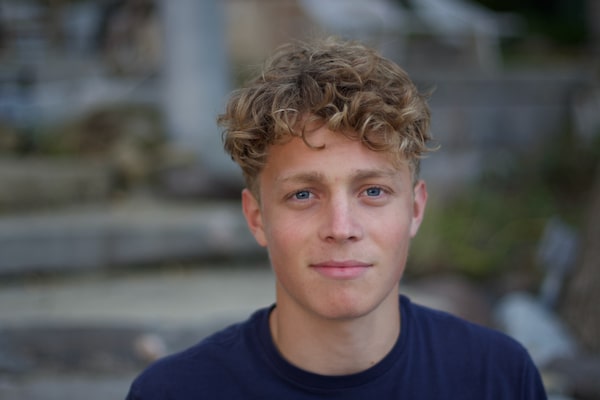
Noah Booth is an 18-year-old Grade 12 student in Kingston who is planning to attend Dalhousie University next year to study science.Supplied
While most of us were online shopping and ordering takeout during the pandemic, high school student Noah Booth wrote a book.
It’s called A Rich Future: Essential Financial Concepts for Youth. Did I lose you there? Clever book-naming may not be Mr. Booth’s strength, but he’s a pro at book-writing. Think of this volume as a definitive answer to a question I get a lot: Can you recommend a personal finance book for young readers?
The book covers it all: saving and spending, wants and needs, the magic of compounding and the basics of investing. David Chilton, author of The Wealthy Barber, is mentioned in the acknowledgments for his help with book, and a division of Royal Bank of Canada RY-T has purchased thousands of copies and invited Mr. Booth to speak at events.
Mr. Booth’s key message to readers is to build good financial habits at a young age. “I think it’s really powerful to start learning these topics young before you throw yourself into a world of bills and having a job,” he said in an interview.
But there’s another, equally important lesson to be pulled from this book and the story behind it. Mr. Booth’s success is as much about entrepreneurialism as the foundational rules of personal finance.
Today, Mr. Booth is an 18-year-old Grade 12 student in Kingston who is planning to attend Dalhousie University in Halifax next year to study science. Six or so years ago, he was a kid with enough interest in personal finance to gulp down a copy of The Wealthy Barber purchased for him by his parents.
For those who don’t know, The Wealthy Barber is this country’s greatest ever book on personal finance. It’s hard to imagine a better testament than Mr. Booth soaking it up as a teenager almost 35 years after it was first published, and then pursuing a book of his own.
A Rich Future had its origins in a class project on personal finance, which culminated with Mr. Booth making a presentation to his class. “What I found was that my friends, and I think my class, didn’t know what I was talking about.”
Discouraged by the lack of books for kids his age about money, he complained to his mom. Her response: Why don’t you just write one yourself?
Some kids would have responded with a shrug or a “yeah, right.” Mr. Booth started writing a book as an independent learning project, and then completed it during COVID-19 lockdowns. Using money earned through mowing lawns and shovelling snow, he had the book professionally edited and designed.
Roughly 6,000 copies have been sold so far and enough money generated to help cover Mr. Booth’s expected university expenses. He’s also appeared at events for RBC and in schools. “It’s been really cool because what started sort of just as a passion or a project has turned into sort of a small business for me.”
A tax break for young adults getting into the work force
A Rich Future is written in a clear, loose, upbeat style that sounds like Mr. Booth talking to you in an informed but non-judgey way. He’s big on saving and paying yourself first, lukewarm on credit cards, and savvy about how social media and the internet influence people to spend money. On real estate and home ownership, he’s refreshingly neutral.
The most original chapter is the one titled “How to Get Your Own Money.” So much of personal finance is about what to do with the money you have. Mr. Booth is a rare voice addressing the idea of making money to save and invest. He does this by telling the story of a few “kid entrepreneurs,” including a fellow Kingston resident and artist named Evan Sharma.
The detail that best highlights Mr. Booth’s level head about money is the fact that he plans to study science in university, not finance or business. He has a lot of interests and isn’t sure what career he wants.
As for his mission to help kids be smarter about money, there is still work to be done. Asked what his friends think of his book, Mr. Booth was blunt. “I think not many of them have read it, actually.”
Are you a young Canadian with money on your mind? To set yourself up for success and steer clear of costly mistakes, listen to our award-winning Stress Test podcast.